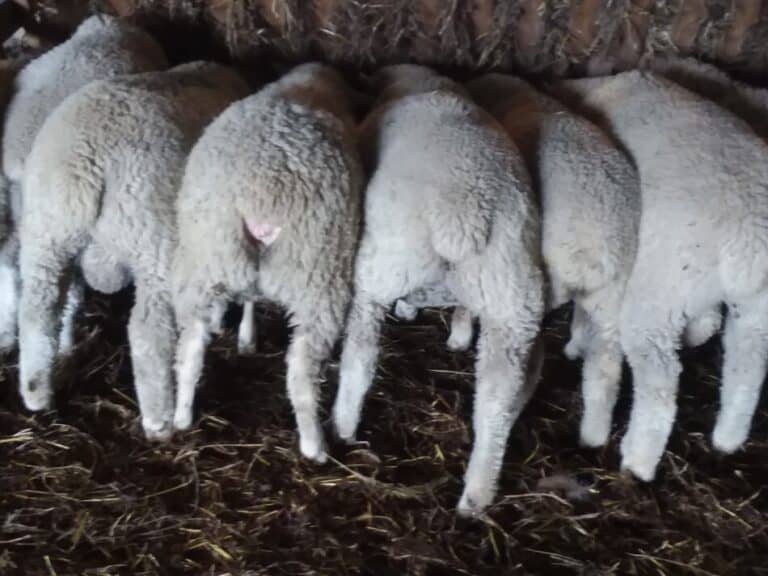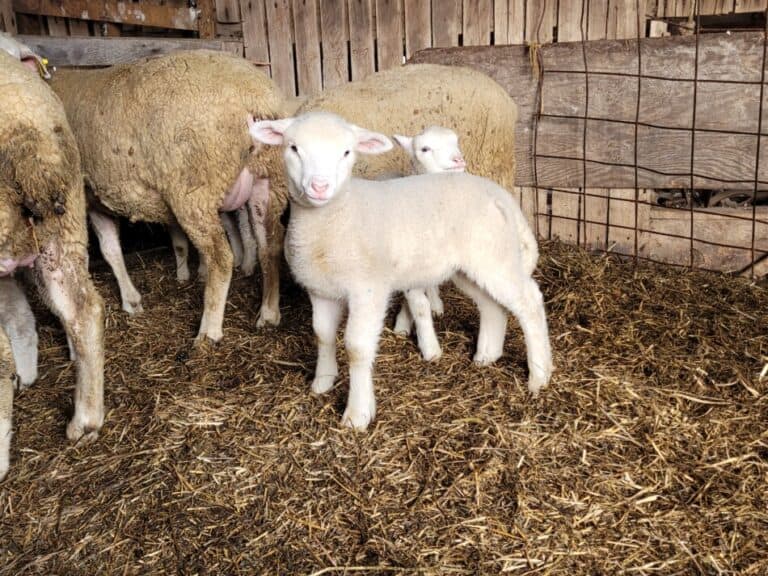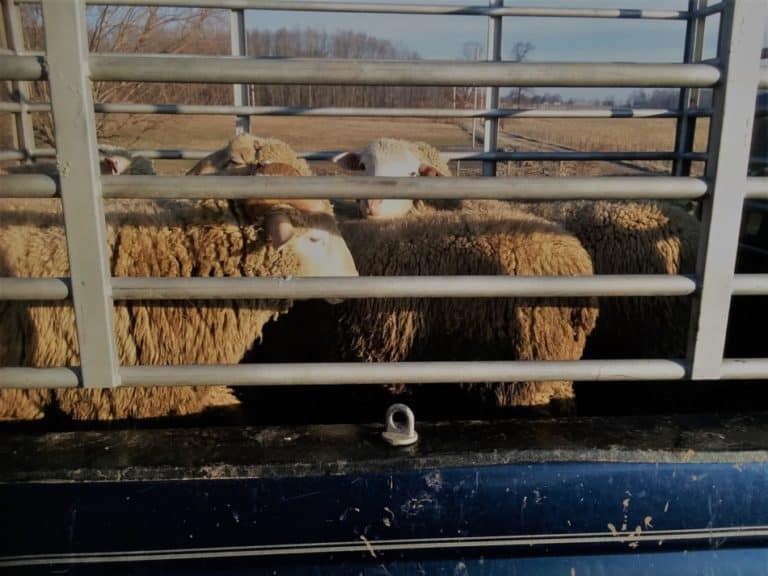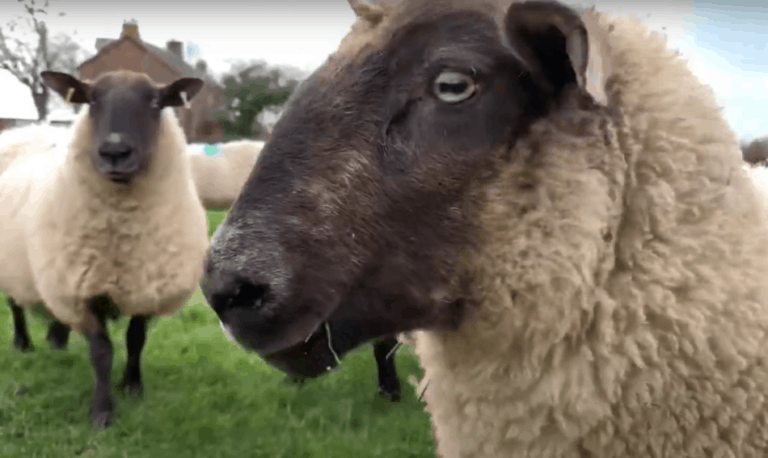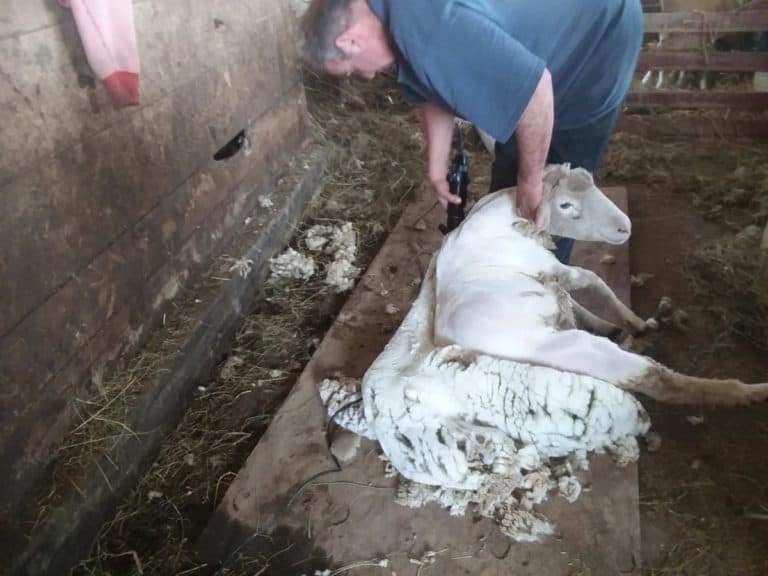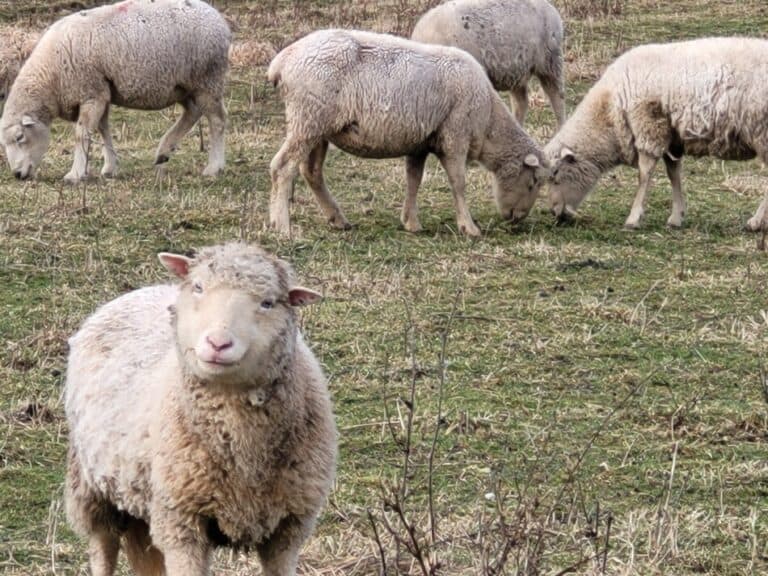9 Things You Need To Raise Sheep
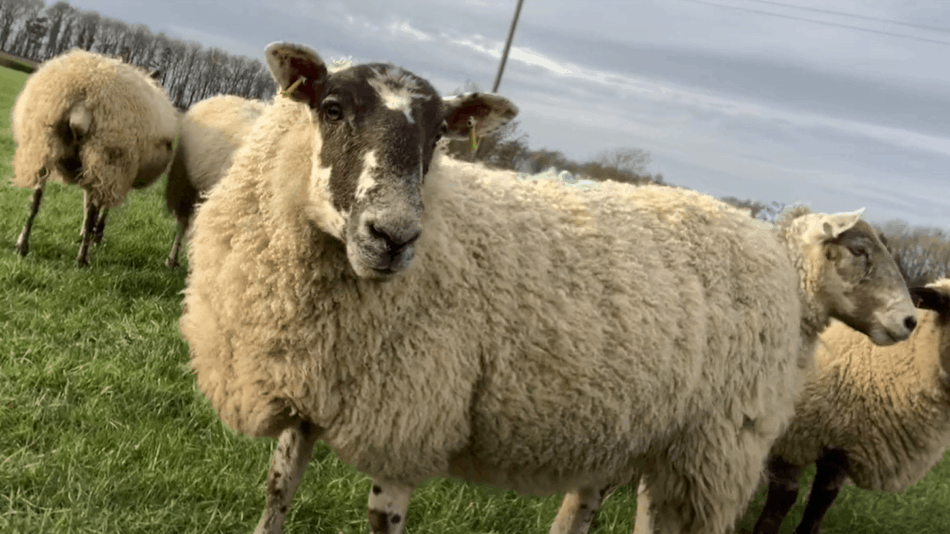
Thinking about getting into sheep, but not sure of what you’ll need? Here’s list of the things you need to have figured out to successfully raise sheep.
You need a plan for your sheep
First off, to raise sheep that you are happy with, you’ll need a plan. Not all sheep are ideal for every purpose or every place and situation.
Easy Sheep Breeds will give you my recommendations for beginner friendly sheep to consider.
What is it that you want those sheep to do for you?
- Are you just looking for a small flock to keep down the grass in the pasture? In this case, locally adapted, easy care will be a high priority for your flock selection.
- Do you want to sell market lambs at the auction? You’ll want the type of lamb that sells well in your area, this means a few trips to the auction to get an idea of what is working for other sheep farmers.
- Maybe you are thinking of selling custom raised freezer lamb? If you are planning on custom processing sheep for direct sales, what is it that folks in your area value and are willing to pay for when it comes to their lamb?
- What about putting together a flock of a special breed of sheep that really catches your attention? Maybe a breed that shows well or something more like a rare breed that needs more shepherds and support or a specialty wool breed that would allow you to get into handspinning or other wool crafts.
You’ve got a lot of choices here and these are just a few of the many options you could have for your flock’s purpose.
You want to be happy with the sheep you end up buying. Spend some time on this step.
Get sheep that fit your farm plan
Get a starter flock of sheep that are locally raised (or as local as possible) from a shepherd who is managing sheep the way you want to manage sheep.
The closer you start to your ideal sheep, the easier it will be for you and your flock to be happy!
It will take a few years for you to figure out how well your sheep fit your farm, so give yourself some grace for the first few years. You’ll learn as you go.
By the time lambs that were born on your farm are raising lambs themselves, you should be seeing the results of your selection starting to pay off.
If you decide to change your flock’s focus in a few years, no worries, just start using rams that are more of what you think your sheep need.
Pros And Cons Of Raising Sheep will give you an honest look into the good stuff and the not so good stuff about raising sheep.
You should have access to plentiful grass for sheep
Sheep need daily access to plentiful grass or other forages.
One of the outstanding characteristics of sheep, as ruminants, is their ability to thrive on grass, which is wonderful, if you have it! Do you have available plenty of grass, or other sheep friendly forages, that are just waiting to be eaten?
When looking around, consider those out of the way areas that are commonly overlooked in your area.
What about the grass:
- in your yard
- in your neighbor’s yards
- in the hard to mow areas around your property
- at the edge of the woods, where the briars are taking over
- a neighbor’s hay field
- an unused pasture that is being brush hogged down
- under the power lines
Once you get to looking around, it’s pretty easy to find unused grass. Think about ways you could get your sheep there that would benefit both you and the land owner.
Other unused grass or forages would be on hunting properties. Often the main hunting season is for a restricted time period, what about the rest of the year? Especially if that land owner is mowing to keep back undesirable growth.
Managing And Utilizing Pastured And Harvested Forages For Sheep is an article from Purdue University which will get you into more of the technical aspects of feeding your sheep economically.
You should have access to plentiful water for sheep
Ideally, you will have plentiful water on your farm for your sheep. While sheep are not “big drinkers” compared to something like a family cow, they still need to drink so your sheep will need a source of clean water, year round.
For our sheep, we use stream access anytime we can throughout the summer. We try to make the pasture rotations so that the flock has access to one of the streams, so we have less water to worry about.
In the places where there is no stream access, we cart water out to them with a water wagon. This is just a flat bed hay wagon with a water tank on top.
The water is run out into a 60 gallon trough, which is short enough for the ewes and lambs to reach the water.
We have to bring the wagon back to the barn to refill every few days, then take the wagon back out and park it along side the paddock. We park the wagon so that we don’t have to move it for a few days but still get the sheep new grass.
If you are paying for city water or have limited access to water on your farm, this will limit the number of sheep your farm can support.
Sheep need fence
Your sheep will need a fence.
Unless you are very fortunate and have a nicely fenced in property already, you’ll need to figure out some sort of fencing for your sheep. You can use permanent fence, portable fence or a combination of both for your flock.
We have very little permanent fence, what we do have is woven wire. The great thing about permanent fence is you don’t have to worry about it, all you have to do is keep the gates shut.
Occasionally, you’ll get a reacher, who can put her head through the wire, but ends up stuck, but other than that, woven wire is great for sheep.
We know of some folks using high tensile fence for sheep, that has never worked for us. We had some when we first go married and the sheep were out all the time. I know it works for some people, for us, not so much!
The other option you have with fence is to go with portable fencing for sheep. There are multiple ways to do this, we use electric netting. Read ElectroNet 9/35/12 For Sheep for the full scoop on netting and sheep.
There are shepherds who are keeping sheep on single strand division wires, usually 3-5 electrified strands, but that has never worked for us so I can’t say much about how to set it up!
If you are planning to have your sheep on portable fencing, get them from someone who also has sheep on portable fencing, preferably the kind you plan to use. It will make your life as a new sheep owner easier.
You can use whichever fence you feel suits your operation the best and just cull out any sheep that will not cooperate. This will take some time and, of course, some hard decisions when culling, but it is doable.
If you do not want to work with your sheep to train them to the fence, get your starter flock from a shepherd that has already done this for you.
Sheep may need more feed than grass
Depending upon where you live, you are likely to need more to feed your sheep than just grass, specifically in the winter. Most folks raising sheep will be feeding some sort of stored forages, like hay, in the non growing season.
How Many Bales Do Sheep Need? will show you how to calculate out your flock’s hay needs.
Hay feeding is not mandatory, you can raise sheep without hay, as long as you have adequate stockpile to get them through the non growing season. Stockpile is grass that grew in the summer, but is eaten by your sheep in the winter.
Word to the wise, feeding no hay requires quite a bit of management on your part, including moving the sheep in the winter to fresh areas of the stockpiled grasses.
If you are not willing to put in this amount of work, or do not have the land base to feed your sheep this way, plan on using hay or other stored forages like haylage to feed your flock in the winter.
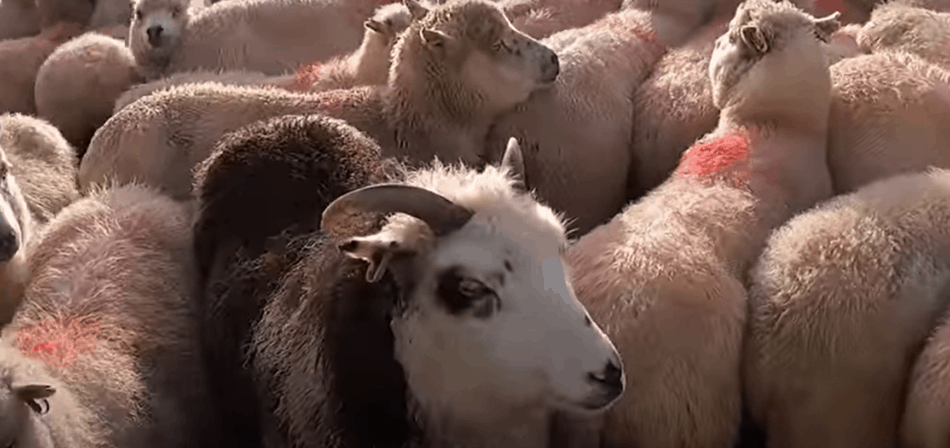
Sheep need some sort of a shelter
Sheep need a shelter, more to get out of the wind in the winter and for lambs that are born in any sort of challenging weather. In the summer, sheep need plenty of space to lay down in the shade. This can be inside or outside.
Your sheep do not need a barn, specifically, what they need is a sheltered area that is protected from the harsh weather conditions of your area.
Our main flock is outside, year round, meaning no barn. They are perfectly fine outside because they are kept in a winter pasture area that has shelter from the weather from multiple directions.
When the wind changes direction, they just move to the other side of the hill or behind a different section of the woods. This way the sheep are able to pick the best place to be no matter the weather conditions.
If your flock does not have multiple options of places to hunker down, depending upon the weather, you’ll need to give them access to shelter in the form of a building or barn.
Ideally, you will have a set up that allows your sheep to come in and out of the shelter, as they please. This way you can let them choose where to spend the day.
Since you are new, let me clear up a potential misconception: if your ewes are due to lamb in bad weather, you must lock them into the barn.
Do not let them have access to the pasture until the conditions in the pasture are newborn lamb appropriate. Ewes that are not due to lamb soon or other adult sheep can come and go as they please, not so for new moms or lambs.
You need a place to sell your sheep
You’ll also need a place to sell your extra sheep. Even if you plan to keep the lambs for the first few years and grow your flock numbers, you’ll eventually get to the place where you can’t keep all your sheep. Now what?
Look around your area for your options.
The easiest one is a local auction. Around here most livestock auctions are weekly with a few auctions on a twice a month schedule. In other parts of the country, the sales are once a month.
As long as the auction is within a reasonable driving distance for you and you have a way to haul sheep (or you could pay a hauler), this will work.
How Much Will My Lambs Sell For? goes over figuring out the current prices at your local auction.
If you have local slaughter houses that process lamb, that is a potential buyer. Keep in mind you’ll still have cull adults to sell somewhere that are not likely to be what the custom meat market wants.
You can, of course, sell sheep privately for grass eaters or meat. Depending upon your area, this can be a very popular option or not so much.
Sheep need some of your time
The final thing sheep need, that most folks gloss over, is your time. You’ll need to spend time with the flock to learn what’s normal and what’s not. This is the cornerstone of animal husbandry.
The only way to figure this out is time spent during daily chores and just hanging out observing them and seeing how they are behaving. You’ll start to pick up on what’s normal and what’s a bit off.
This is crucial knowledge, since sheep are great at hiding the start of illness or problems and really only showing obvious to anyone problems when the challenge they are facing is often too far gone to fix.
We have found that early intervention when a problem is just getting started has very good results. Sheep can come around, but only when you catch it (whatever “it” is) early.
The reason I’m telling you this is that, according to some people, sheep are “just waiting to die”. Not true. Sheep are can be brought around, but once they need help, they hide it. It’s your job to see the need and fix it early.
